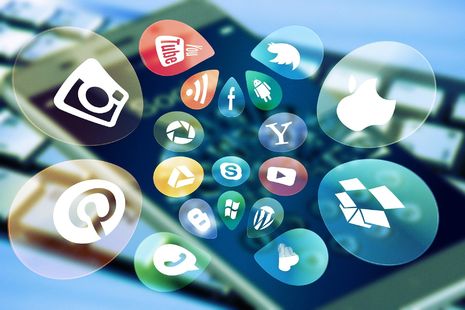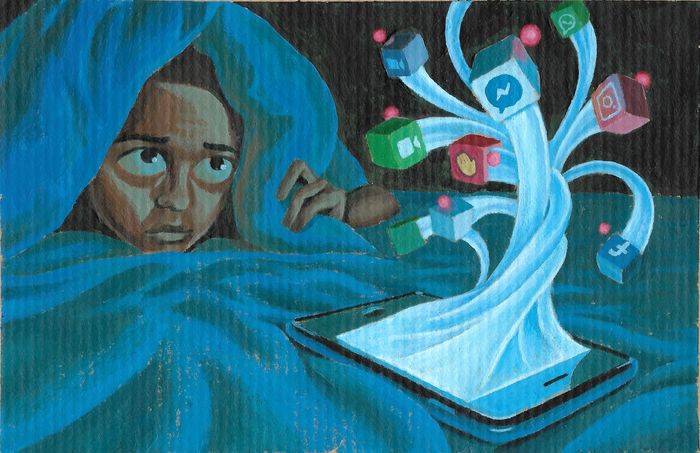Social media: to give up or give in?
Jack Nicholson discusses the dehumanising aspects of smartphone and social media use, and the longing for interaction in the flesh

In January this year, I gave up my smartphone and stopped using my social media accounts. It was something I had been considering since one glorious moment during the last Long Vacation when, as a traveller thinking about ordained ministry in the Church of England, I found myself having tomato soup with an old Northumbrian hermit. He had greeted me, a total stranger, hands outstretched, with an infectious smile on his face beneath his Thomas the Tank Engine bobble hat. Here was a man who had been mostly cut off from the rest of humanity for almost half a century. Yet in the two hours I spent with him, he felt more human to me than anyone I had ever met before. This got me wondering what the rest of us are doing wrong.
My decision to give up my smartphone and social media felt liberating and refreshingly counter-cultural. Blaise Pascal once said that all human unhappiness comes from not knowing how to sit quietly in a room. There is good literature diagnosing this as a problem with the noisy modern world which, as a religious person, I am attracted to. By noise, I mean almost constant activity which risks drowning out anyone’s wellbeing. I admit that I am a person who has struggled with maintaining mental health, and, in my view, sitting quietly in a room can help anyone make sense of the world and one’s place within it. Smartphones and social media were certainly making me unhappy, and I was all too pleased to give them up.
"My decision to give up my smartphone and social media felt liberating and refreshingly counter-cultural"
For me, smartphone and social media use becomes dehumanising. The absence of a smartphone has made me more attentive in interaction with others in the flesh and thankful for the humanity we share. If its absence has given me more time to invest in my experience of myself, by giving me back many hours in the day which apps showed I had been wasting (whilst scrolling through my news feeds and the like), it has also given me time to invest in others. It now seems odd to think that I had allowed technology and media to take up my time, which can be better spent, either thinking or reading, or engaging with friends and even strangers whom one is unlikely to meet again. Of course, any human is worth so much more than one’s phone.
In depriving us of human interaction, however, ‘lockdown’ has prompted me to reassess my decision to bracket social media out of my life. The chance to reconnect with friends who I would not even have seen in normal circumstances – because of physical distance and the busy lives we lead – has been a real blessing to me and to so many I know. Zoom calls feel contrived; eye contact is lacking, and smiles seem, somehow, less radiant. There are no hands to embrace us. These things are imperfect, but they do give us the chance to connect and to build community, and it is especially true today that if used correctly, social media can enhance our lives.
"In depriving us of human interaction, however, ‘lockdown’ has prompted me to reassess my decision to bracket social media out of my life"
Few people become hermits, and for good reason. Our use of social media these days has come with a longing for something purer: community and belonging in the flesh. In turn, lockdown has cast a spotlight on the way in which social media and smartphones can be overused if they detract from pure interaction when we are not in lockdown and people are all around. If we are lonely now, I think we were lonely before too. This goes to the heart of the reason I gave my social media and smartphone up, and it paid off. The paradox is that in sitting quietly in a room from time to time, I felt less lonely. This was because I was more switched on to the real world, to all people, and especially to those in my college community and hometown.
Lockdown has forced us all to spend more time sitting quietly in our rooms, but it has not been a happy experience because the chance to see one another has been curtailed. We have had time to think, and I remember the saying: if you want to understand a person, look at what was happening in the world when they were in their twenties. You may be in your twenties like me, and the world we see is one dealing with problems in mental health, political divisions, and a virus which has hurt us all. The question is ‘what can we do about it?’, and for me one answer is rethinking our social media and smartphone use to build a more human culture as lockdown lifts and we can spend more time together. We, too, shall have infectious smiles and hands outstretched.
 Comment / Plastic pubs: the problem with Cambridge alehouses 5 January 2026
Comment / Plastic pubs: the problem with Cambridge alehouses 5 January 2026 News / Cambridge academics stand out in King’s 2026 Honours List2 January 2026
News / Cambridge academics stand out in King’s 2026 Honours List2 January 2026 News / Cambridge businesses concerned infrastructure delays will hurt growth5 January 2026
News / Cambridge businesses concerned infrastructure delays will hurt growth5 January 2026 News / AstraZeneca sues for £32 million over faulty construction at Cambridge Campus31 December 2025
News / AstraZeneca sues for £32 million over faulty construction at Cambridge Campus31 December 2025 Interviews / You don’t need to peak at Cambridge, says Robin Harding31 December 2025
Interviews / You don’t need to peak at Cambridge, says Robin Harding31 December 2025










